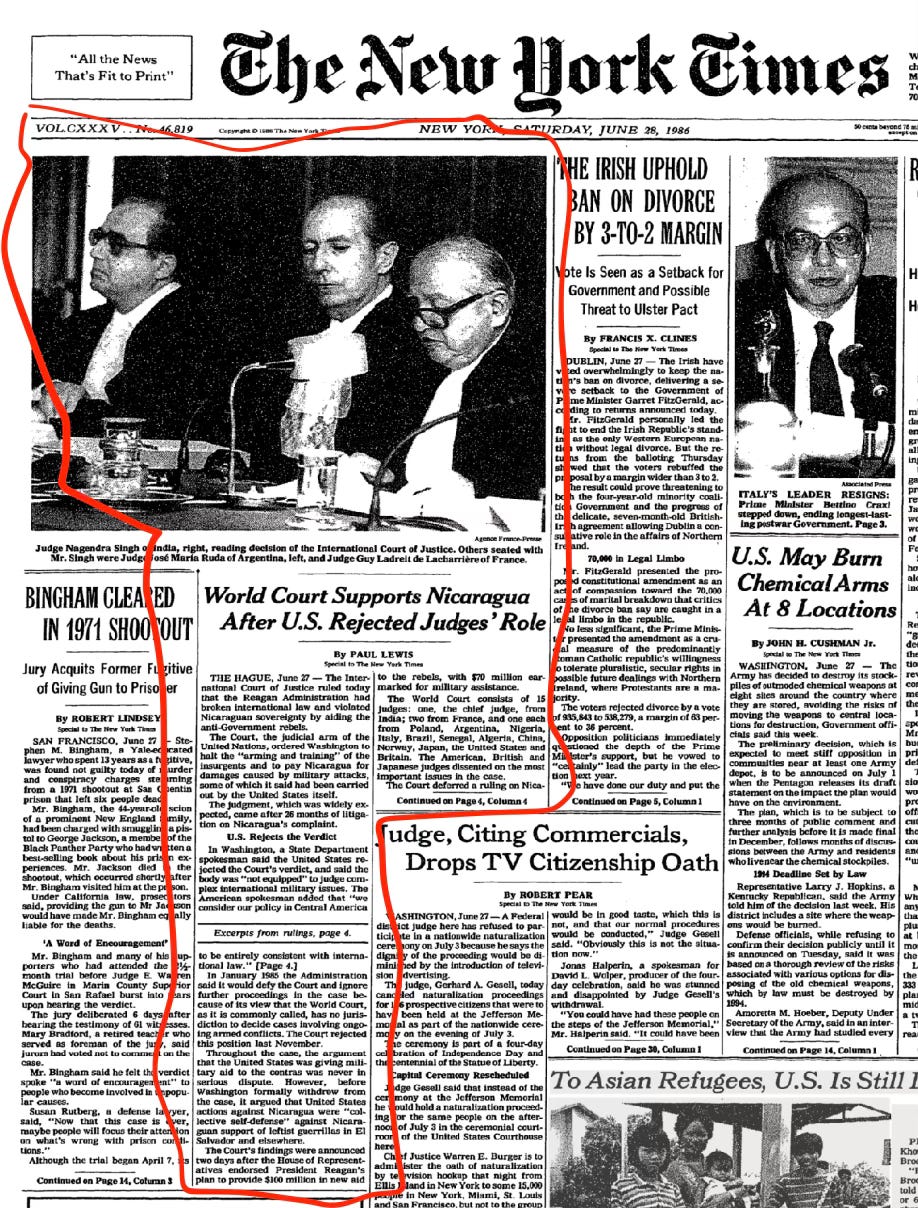Last week the International Court of Justice - the world’s highest court - issued its advisory opinion on the obligations of states under international law to prevent harms to the climate system.
Bob Berwyn of Inside Climate News summarised the 15-judge panel’s unanimous decision:
The court stated that a range of international laws charge governments with legal duties to “prevent significant harm to the environment” and “use all means at their disposal” to prevent activities within their territories from causing significant harm to Earth’s climate.
Among the obligations cited in the opinion are requirements for historically high polluters to cut emissions and enhance their sequestration of greenhouse gases. Governments could be violating their international legal obligations if they continue subsidizing fossil fuels and issuing new licenses for oil and gas production, the court said during an oral reading of its key findings.
If governments breach those obligations, they could be legally liable, and potentially subject to orders from the ICJ or other courts requiring them to cease climate-harming activities or make compensation payments to climate-impacted people or countries, the opinion noted.
That the case was heard at all is remarkable. That it was the product of a student thought experiment just six years ago makes it seem like an Oscar-bait screenplay (and if those kids don’t have an agent pitching this right now I’d be amazed) that you can imagine being hyped as “the feel-good movie of the year” in the trailer.
Laura Clarke OBE, head of the climate advocacy legal nonprofit Client Earth that had (her words) “a very small role” in the case, summed up its potential importance: a “once-in-a-generation legal decision that will shape climate litigation for decades to come”.
Perhaps not surprisingly, countries that have made the largest contributions to GHG emissions - China, the US, Kuwait, Saudi Arabia in particular - argued that there are no obligations under international law to stop harming the climate or that they could be liable for harms.
The opinion isn’t a ruling against emitters. But it reminds people of something that in hindsight is so obvious and simple that every non-sociopathic preschooler tends to understand - if you break someone else’s stuff, that’s wrong, and you have to make amends, ideally by fixing it. And if you do it again, on purpose, you can expect to be punished.
Fifty years of propaganda, arm-twisting, threats, and a delusional fantasy that the most profitable industry in human history would voluntarily stop being as profitable were all deployed at scale to get people to pretend this most fundamental instinct of fairness doesn’t exist. At least, for as long as possible.
The reaction from supporters of the case’s winning arguments were jubilant - and we captured some of that from an event inside The Hague a day after the court’s decision, with voices ranging from Vanuatu’s climate envoy Ralph Regenvanu, the indigenous lawyer and writer Julian Aguon, former Ireland president Mary Robinson, and more.
The reaction from some governments that could face future cases was muted. The BBC reported official UK reaction:
A spokesperson for the UK's Foreign, Commonwealth and Development Office said it was "taking time" to look at the opinion before commenting in detail, but added:
"Tackling climate change is and will remain an urgent UK and global priority. Our position remains that this is best achieved through international commitment to the UN's existing climate treaties and mechanisms."
Fair to say the reaction from United States was the equivalent of raising a giant middle finger. Or - apropos for this side of the Atlantic - two fingers.
America (and Europe) to Earth: Screw You
Because this is The Cursed Timeline, before many of the celebrations in The Hague were finished, the United States - having emitted more GHGs than any other country, went out of its way to promise to emit even more. And to demand other countries do likewise.
Finger 1
On Sunday the US and European Union announced they had reached a “trade” deal. The EU promised to import $750 Billion of fossil fuels from the United States.
Never mind that there isn’t enough capacity for the US to actually supply that much liquified fossil gas, oil, etc to Europe, as Tim McDonnell noted in Semafor. Or that those exports would be competing with US domestic needs for generating power for all that AI-training compute that’s supposedly going to be built - thus increasing the cost of electricity for those projects and presumably for other consumers. Or that, as Bill McKibben among others points out, in fact it might be that the Europeans - who can’t actually deliver on that promise, because the EU doesn’t actually buy fuel - are playing Trump for a fool. Or that energy security won’t exactly be enhanced by replacing supplies from Russia, an increasingly authoritarian petrostate with a volatile and lawless ruler, with supply from the US, an increasingly authoritarian petrostate with a volatile and lawless ruler.
There are two options, neither of them good:
The Europeans mean what they say, even if how they achieve it is unclear. That, as some pointed out, would necessarily have some pretty dire consequences, including:
"This risks locking Europe into decades of fossil fuel dependence, volatile energy bills, and accelerating the wildfires and flooding already wreaking havoc across the continent," said Andreas Sieber, associate director of policy and campaigns at climate group 350.org.
In the context of the ICJ advisory opinion just days earlier, on its face that increased commitment to fossil fuels might itself violate international law.
The Europeans are lying and have no intention of honouring their pledge. That also necessarily has dire consequences, and they are more immediate than imports that may or may not happen: including the destruction of EU credibility on climate and being seen to appease not just Trump but Europe’s own anti-climate right wing populists.
It certainly begs a lot of questions.
Robert Hodgson in Euractiv: “Maintaining current levels of fossil fuel use is not an option, even in the relatively short term, unless the EU plans to follow Trump out of the Paris Agreement.”
AFP reports other reactions, including: “Francois Gemenne, a policy expert who co-authored the UN's most recent IPCC report on climate change, in 2023, accused the EU of ‘submission’ to Trump's pro-fossil fuel agenda.”
For their part, the European Commission would like you to know they’re following the Trump playbook in comms, not just energy: “‘This agreement does not contradict our medium- to long-term decarbonisation objectives or targets at all,’ a commission spokesperson told reporters of the three-year energy pledge.”
Nothing to see here. Move along.
I’m sure that’ll wash at COP30 in Belem when it comes time for European negotiators to play their traditional role of climate hawk, pushing for more ambitious climate action.
Finger 2
In 2007, the US Supreme Court (granted this was in the Before Times) ruled that carbon dioxide could be regulated because of the overwhelming scientific consensus that it was causing harm. Two years later the US Environmental Protection Agency determined (AP): “that carbon dioxide and other greenhouse gases endanger public health and welfare. The ‘endangerment finding’ is the legal underpinning of a host of climate regulations under the Clean Air Act for motor vehicles, power plants and other pollution sources that are heating the planet.”
Citing a nonsensical, deeply dishonest, publication written for the US Department of Energy by five of the most infamous climate deniers, EPA administrator Lee Zeldin1 said the US would be scrapping the 2009 rule. Because everything is fine now and CO2 is just plant food and suck it, nerds.
Again, because this is The Cursed Timeline, Zeldin decided the best place to announce this wouldn’t be in a letter to Congress, EPA staff, or at the White House podium, but on the “Ruthless” MAGA podcast.
“There are people who, in the name of climate change, are willing to bankrupt the country,” Zeldin said on the conservative “Ruthless” podcast. “They created this endangerment finding and then they are able to put all these regulations on vehicles, on airplanes, on stationary sources, to basically regulate out of existence, in many cases, a lot of segments of our economy. And it cost Americans a lot of money.
…We are driving a dagger straight into the heart of the climate change religion [sic].”
As strategy, this is climatis delenda est. Not enough to quit the Paris Agreement, gut the incentives for clean energy in the Inflation Reduction Act, and shut down as much Earth observation as possible to destroy further evidence of the effects of greenhouse emissions. This is to salt the earth to make it as difficult as possible to even go back to the status quo ante Trump 2.0.
Does an ICJ Opinion Even Matter?
Australian climate journalist Royce Kurmelovs, who kindly talked us through his coverage of a climate case taken by indigenous people in the Torres Strait vs Australia, detailed for Drilled how the ICJ opinion could affect future Australian cases. He quotes Isabelle Reineke, Executive director of the Grata Fund in that it, “seriously calls into question the legality of Australia’s current and past policy setting under international law, including its past and ongoing approval of fossil fuel projects”.
The US, on the other hand, is being about as clear as it can that it now wants to be the poster child for reneging on its climate commitments and completing its realignment to be a lawless, autocratic petrostate bent not even on denying climate change but accelerating it and dominating whatever world is left as a result.
So the Hollywood metaphor works perfectly - plucky Pacific Islander kids take on the world and win an impossible but symbolic victory and the audience dabs its eyes at this hopeful and entertaining testament to the human spirit. But once the lights come up, nothing actually changes.
Other than Israel, few countries have made more of a point of giving two fingers to world opinion - and specifically the International Court of Justice - than the United States.
In 1984, Nicaragua took the United States to the “World Court” (ICJ) to argue the Reagan Administration’s support for the contra rebels fighting the USSR/Cuba-friendly Sandinista government, including the covert mining of the country’s harbours, was a flagrant violation of international law. In 1986, after the US refused even to participate in the court’s proceedings, the ICJ ruled against the United States.
The US refused to acknowledge it had any obligation to follow what the court had ruled. And that could be that. But it wasn’t.
In an astute 2022 paper, California Polytechnic history professor Andrea Onate-Madrazo argued that far from having no effect on American policy or behaviour, the 1984 ICJ case from Nicaragua - and the swift refusal by the Reagan Administration to accept that ICJ had any legitimate jurisdiction - helped create a “politics of shame”. Manifest as international condemnation amongst its allies as much as its adversaries:
the matter evoked a strong reaction abroad. Media sources from around the globe took an interest in the issue and newspapers in France, Ireland, Great Britain, Lebanon, the Soviet Union, India, amongst others, ran cover stories detailing Reagan’s rejection of the ICJ’s jurisdiction.
The editorial piece “Out of Court,” published in The Irish Times on 11 April was prophetic in warning that “there can be no doubt that this treatment of the Court will fuel anti-American propaganda all over the world. Whatever the small print says, the wiser course for Mr. Reagan would be to meet the Nicaraguan complaint head-on and argue it out in public view.”
The case, and the international reaction, helped fuel domestic opposition to the US policy on Nicaragua, leading to a series of legal restrictions on sending aid to the contras collectively known as The Boland Amendment. That in turn led the US administration to embark on an arcane scheme to avoid the law that wound up as the Iran-Contra scandal.
As Onate-Madrazo argued this underscored the Court’s real power:
The World Court lacks mechanisms to enforce its rulings or punish defectors. The Court’s real power rests in its ability to sway world opinion and “mobilize the politics of shame.” In the case of “Nicaragua v the United States of America” this reality had important policy implications to the extent that opinions, swayed by the ICJ case, affected the United States Congress and helped shape its legislation.
The Reagan administration had hoped that by not participating in the ICJ’s proceedings it would limit the impact of the case upon domestic and global opinion. Not participating, it hoped, would thwart public attention away from the entire matter. The strategy backfired as rejection of the Court merely added an additional layer of opposition to what the administration already faced on account of the mining incident. News of CIA involvement in the mining coupled with the White House’s snubbing of the World Court produced a strong bipartisan opposition in Congress. This opposition would prove to be the main impetus behind the Boland Amendment II.
You can argue - and many will - that the judgement is something of a farce. And that it says something that if anything the current US administration has even more contempt for the opinions of the rest of the world than their predecessors 40 years ago.
That’s also why it will be fascinating to see how this plays out.
Telling the rest of humanity “go f*ck yourself” and gleefully condemning whole countries like Vanuatu to be “sacrifice zones” just as much as “cancer alley” communities in Louisiana affected by the newly-energised projects like Venture Global’s LNG export project may not be cost-free, even for the United States.
If the current US president has a super-power it would be his seeming immunity to any “politics of shame”. But the danger is he very much understands how it works on non-sociopaths. The point of getting Europe to submit and appease his demands on trade by promising to buy fossil fuels isn’t random. It was chosen because it will cause the people who caved in to him by publicly renouncing their own values to feel exactly that sort of shame that will make them less able to resist his demands in future. It is the politics of the abuser.
But by forcing the issue out of strategic ambiguity and diplomatic wiggle room into stark relief, the US is now to climate as Israel is to Gaza - a lawless and criminal actor that leaves even its friends no choice but to eventually walk away and seek to end its crime spree. Like Gaza, this will probably demonstrate that most of the Global North is willing to be complicit with extreme levels of suffering before it will be willing to say, ‘enough’.
The ICJ opinion likewise removes space for strategic ambiguity. In its 80-year history the ICJ has issued just four unanimous rulings, in this case including an American among its 15 judges. No other case has attracted anything close to the 130+ submissions this did. No other case has so directly recognised stakes so existential for the future of the entire species. No other case has created a predicate on which an entirely new set of court cases worldwide could be based.
The Other Cases
There are thousands of cases of climate litigation working their way through courts worldwide. Some are human rights cases. Some are consumer-protection cases that call out fossil fuel firms for lying about the risks they knew their products would cause. And some are pure good aul-fashioned torts that argue, thanks to attribution science, that it’s possible to hold individual firms legally liable for damages resulting from their reckless disregard. As friend-of-the-show and Climate Confident host Tom Raftery wrote:
the next wave of lawsuits may go beyond delay and reputational damage. We’re talking fines, asset write-downs, and forced divestitures. Climate risk is now legal risk.
I’m not a lawyer but I will be asking some on the show in the coming weeks to tease that out.
As Laura Clarke of ClientEarth said to Akshat Rathi on Bloomberg’s Zero:
the ICJ is about state responsibilities and state obligations, so it can't directly hold companies or businesses to account. But what it did say, and I talked earlier about this question of states having a due diligence requirement to take action, that states have an obligation to regulate private actors. If a private company is producing huge amounts of emissions, then the state has a responsibility to regulate them and stop that harm. So I think that's a really important development. So if, for example, you have a fossil fuel company that's polluting with abandon, the country has to, under international law, regulate them and stop that. It's again. It's just another tool, I suppose, to drive corporations to do the right thing.
So here’s a fun thought experiment. Perhaps Julian Aguon or Laura Clarke could help flesh it out.
Let’s say Vanuatu residents successfully sue one of the many subsidiaries of ExxonMobil operating in a relatively climate-sane jurisdiction, in that country’s courts, with the assist from a local NGO. Maybe citing the Peruvian farmer suing German utility RWE as precedent. In response to the judgment, Vanuatu, citing the ICJ ruling, sues that government for compensation.
The government of the climate-friendly jurisdiction in turn ‘discovers’ that ExxonMobil has been lying for 40 years about what it knew about the effects of its products on the climate, and that the government of the United States had been in possession of that information for at least as long - while publicly saying otherwise. That government then in turn sues the United States.
The ICJ rules that the United States is liable to pay compensation for its failure both to curb emissions or to regulate ExxonMobil to prevent it from causing harms suffered by that Vanuatu resident.
What happens then?
In this Conversation
Prof. Elizabeth Holland was teaching the University of the South Pacific around the time that some of their students conceived of the legal action that led to last week’s ICJ opinion. She kindly shared her reactions to the ruling, and started out citing this NY Times op-ed, ‘Climate Science is Now the Law’.
00:16 The Court's Advisory Opinion
00:54 Human Impact and Cultural Struggles
01:14 End of Impunity and Legal Obligations
02:03 Interview with Professor Elizabeth Holland
02:43 Reactions to the ICJ Ruling
05:22 The Role of Small Island States
05:50 Challenges in Climate Negotiations
08:01 Legal Frameworks and Obligations
09:43 Implications for the United States
12:33 Personal Reflections and Contributions
14:34 Celebrating the Youth Movement
18:17 Art and Culture in Climate Advocacy
21:21 Generational Promises and Songs
26:38 Conclusion and Call to Action
Outro and Outros
Normally we start these posts with our outro for the episode. In this episode we have a couple of pieces in addition to our usual insanely good intro track we got from Suncharmer.
And there is also a very topical intermezzo from Mia Kami, whose Hague performance after the ICJ ruling we share:
All the Outros
Like figuring out the perfect wine pairing for a book (weird, right?) we do enjoy trying to figure out what exit music would be best with the episode’s content. Here they are:
Once upon a time Lee Zeldin was not (as much of) a joke and a shill but represented the East End of Long Island, NY in Congress.














